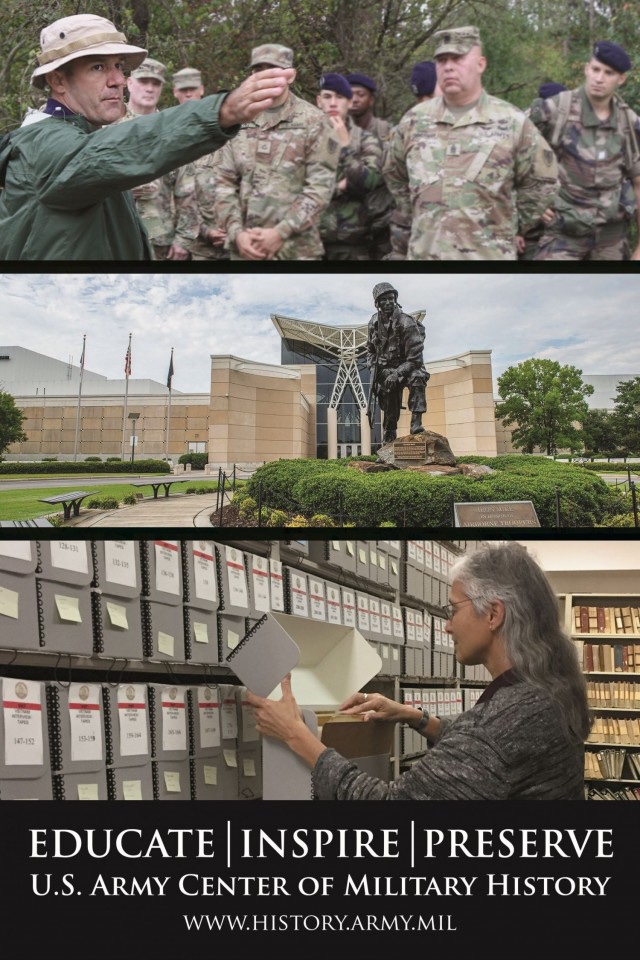WASHINGTON, D.C.— The study and use of history is a critical tool in the Army profession. It helps to inform current decision making, inspires Soldiers to serve, and builds morale and esprit in units.
“History helps us learn from the past, see the present and be ready for the future” said General Paul E. Funk II, Commanding General of the U.S. Army Training and Doctrine Command (TRADOC). “You have to understand your historical roots to become an effective leader.”
At this year’s Association of the United States Army (AUSA) Annual Meeting from October 11-13 at the Washington Convention Center, the U.S. Army Center of Military History (CMH) will host a Kiosk promoting the value of history in the Army. Preparing Soldiers at all levels to be historically minded is a significant role for CMH, an organization within TRADOC.
The Executive Director of CMH, Charles R. Bowery, Jr. points out, “All ranks in the Army, from the most junior trainee to the Chief of Staff, benefit from historical awareness in different ways. Every Soldier should understand that they are serving something bigger than themselves.”
A true understanding of history goes well beyond simply knowing key dates and events. The lessons of history develop critical thinking skills in Soldiers as they understand the reason why and how events unfolded in the past and their connection to today. It develops a more informed use of actionable history in current staff planning and decision making.
According to Dr. Peter G. Knight, Chief of Field and International History Programs at CMH, “We frequently respond to requests for information about historical events to help develop viable courses of action for Army leaders.” Knight recommends all Soldiers can use existing programs within the Army to improve their historical perspective. “There are professional military education courses and leader developmental programs like staff rides that can hone critical thinking skills.”
Staff rides are a unique and persuasive method of teaching the lessons of the past to the present day leaders. They can bring events to life and provide a greater understanding of tactics, leadership, strategy, communications and the psychology of Soldiers in battle. The staff at CMH develop and lead staff rides for U.S. Army organizations and provide detailed staff ride pamphlets online for free downloads.
Beyond decision making, history is also a key part of many aspects of a Soldiers career from understanding the rich heritage of his or her unit to accessing VA benefits as they transition to civilian life. Knight says, “A unit history program not only helps build esprit de corps, but it helps ensure unit awards and unit campaign participation credit are up to date.”
History also builds morale and helps to inspire men and women to serve by providing examples of those who exemplify Army values. “It connects Soldiers to their unit through activations, lineage and honors, unit decorations, and unit heritage” Knight said.
Leader support for the Army History Program will improve the understanding of history and its essential application in all units. Key elements of the program include assigning unit history officers, including Command Historians as part of staff functions and the use of Military History Detachments. Knight says “If you ever asked your staff if a certain situation has happened before or how did we handle a situation in the past, then you need a unit historical program.”

Other ways to expand historical mindedness is accessing the publications and research resources on the CMH website. Bowery also points out that “The Chief of Staff’s professional reading list is the best place to start. CMH and Army University Press also have thousands of free publications that Soldiers can access.”
The value and benefits of using history in the Army are significant factors to the success of units and individual Soldiers careers. The Center of Military History is a valuable resource with multiple tools that are available to all Army units and personnel.
“The Center of Military History can do all sorts of things for a leader development program, they can provide staff rides, they can provide lessons learned, and they can be the historical reference you need.” GEN Funk said.
By Francis Reynolds
Additional Resources:

